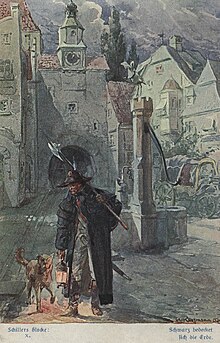Watchman
Watchmen were groups of men who discouraged crime and enforced the law. They were usually authorised by the state or government. Watchmen have existed in many places around the world throughout history. Today, the job of law enforcement has generally been taken over by organised police.

An early reference to a watch can be found in the Bible. Ezekiel says that it was the watchmen's duty to sound the alarm to warn the people that they were under attack (Ezekiel 33:1-6). The Roman Empire turned the role of a watchman into a profession. The Vigiles was the city watch in Rome. It was the city's police force.
In England, the Ordinance of 1233 required the appointment of watchmen.[1][2] The Assize of Arms of 1252 and the Statute of Winchester of 1285 are considered among the earliest examples of a police in England.[3][4][5] The Assize of Arms required that constables be appointed to call men to fight when the town was under attack. It also required them to stop disturbances of the peace, and to take criminals to the sheriff. By 1415, a watch was appointed to the Parliament of England. King Henry VII appointed a watch for his house, the Tower of London, in 1485. These watchmen became known as the Beefeaters.
References
change- ↑ Pollock, Frederick; Maitland, Frederic William (1898). The History of English Law Before the Time of Edward I. Vol. 1 (2 ed.). p. 565. ISBN 978-1-58477-718-2.
- ↑ Rich, Robert M. (1977). Essays on the Theory and Practice of Criminal Justice. p. 50. ISBN 978-0-8191-0235-5.
The origin of the exception goes back in English history to the Ordinance of 1233 which instituted night-watchmen, and directed them 'to arrest those who enter vills at night and go about armed.' Later the Ordinance of 1252 mentions 'disturbers of our peace.'
- ↑ Clarkson, Charles Tempest; Richardson, J. Hall (1889). Police!. pp. 1–2. ISBN 9780824062163. OCLC 60726408.
- ↑ Delbrück, Hans (1990). Renfroe, Walter J., Jr (ed.). Medieval Warfare. History of the Art of War. Vol. 3. p. 177. ISBN 0-8032-6585-9.
{{cite book}}: CS1 maint: multiple names: editors list (link) - ↑ Critchley, Thomas Alan (1978). A History of Police in England and Wales.
The Statute of Winchester was the only general public measure of any consequence enacted to regulate the policing of the country between the Norman Conquest and the Metropolitan Police Act, 1829…
More reading
change- David Barrie, Police in the Age of Improvement: Police Development and the Civic Tradition in Scotland, 1775-1865, Willan Publishing, 2008, ISBN 1-84392-266-5. Chapter "watching and wardning", pp. 34–41[permanent dead link]